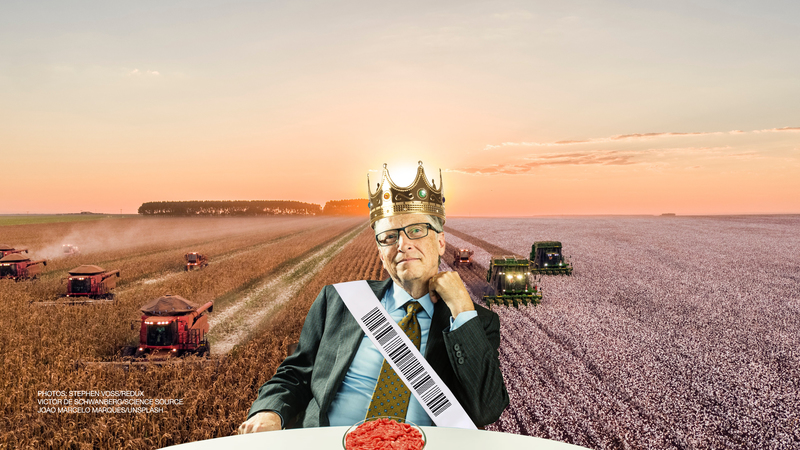
The Bill and Melinda Gates Foundation supports large-scale industrial farming. In classic neocolonialist style the Gates Foundation shifts property ownership from Africans, into the hands of big Western corps.
In the last 17 years the Bill and Melinda Gates Foundation has spent nearly US$6 billion in their quest to “improve agriculture” in Africa. For an underfunded sector you can pretty much call them the royalty of African agriculture.
Research was published by GRAIN, a small international non-profit organisation that works to support small farmers and social movements in their struggles for community-controlled and biodiversity-based food systems. They have uncovered all of the Gates Foundation’s interests in Africa.
GRAIN created a database of the Foundation’s grants in the area of food and agriculture from 2003 through to 2020. The database reveals a total of 1130 grants for food and agriculture, worth nearly $US6 billion of which almost US$5 billion is supposed to service Africa; there was no shift to try and reach groups in Africa directly, no refocusing away from the narrow technological approach, and no moves to embrace a more holistic and inclusive policy agenda; and that the Foundation’s Trust Fund, which manages the Foundation’s endowment, has big investments in food and agribusiness companies, buys up farmland, and has equity investments in many financial companies around the world.
Almost half of the Foundation’s grants for agriculture went to four big groupings: the global agriculture research network of the Consortium Group on International Agricultural Research (CGIAR); the Alliance for a Green Revolution in Africa (AGRA, set up in 2006 by the Gates Foundation together with the Rockefeller Foundation); the African Agricultural Technology Foundation (AATF, a technology centre pushing Green Revolution technology and GMOs into Africa); a number of international organisations (World Bank, UN agencies, etc.). The remaining money ended up with hundreds of research, development and policy organisations across the world. The Gates Foundation claims that 80 percent of their grants are meant to serve African farmers, but of the funding to these hundreds of organisations a staggering 82 percent was channelled to groups based in North America and Europe while less than 10 percent went to Africa-based groups.
The single biggest recipient of grants from the Gates Foundation is the CGIAR, a consortium of 15 international research centres launched in the 1960s to promote the Green Revolution with new seeds, fertilisers and chemical inputs. The Gates Foundation has given CGIAR centres US$1.4 billion since 2003. Another priority for the Gates Foundation through its funding is to support research at universities and national research centres in Europe and USA. Together, all this research gets almost half (47%) of the Gates Foundation’s funding.
The Gates Foundation heavily funds AGRA, a high-profile advocacy organisation. The Gates and Rockefeller Foundations launched AGRA in 2006 as a “farmer-centered” and “African-led” institution. AGRA coordinates and promotes networks of pesticide and seed companies and public agencies to sell and supply agriculture inputs to farmers across Africa. It also actively lobbies African governments to implement policies that favour seed and pesticide companies, such as patents on seeds or regulations that allow for GMOs.
The Gates Foundation has given AGRA a whopping US$638 million since 2006. But AGRA’s results are underwhelming to say the least. In the countries where AGRA is active, yields of staple crops increased only 18% over the past 12 years- far short of AGRA’s goal of doubling yields. Meanwhile, undernourishment (as measured by the FAO) increased by 30% in those countries.
Recently Bill and Melinda launched “Gates Ag One”, an initiative that claims to speed up the development of new seeds and chemicals and get them to farmers in sub-Saharan Africa and South Asia more quickly. Where will the institute be based? Not in Ethiopia or Sri Lanka but in St. Louis, home of Monsanto and other GMO and pesticide giants.
Of course, AGRA itself is also actively pushing the African policy agenda. AGRA is among the key conveners of the annual Africa Green Revolution Forum (AGRF). Partners include some of the main global agrochemical corporations, such as Bayer, Corteva and Yara, and of course the Gates Foundation itself.
GRAIN’s conclusion was that the Foundation provides no funding to support farmer seed systems, which supply 80 to 90 percent of all the seeds used in Africa. The Gates Foundation instead provides a lot of funds to initiatives that destroy them. Furthermore, the Gates Foundation props up biofortification as a solution to malnutrition, taking funds and attention away from much more practical and culturally appropriate efforts to improve nutrition by enhancing on-farm biodiversity and people’s access to it. Over the past decade, the Gates Foundation has given over US$70 million to biofortification initiatives that essentially seek to artificially pack nutrients into single crop commodities.
GRAIN has not been the only org to notice the Foundation’s discrepancies and hypocrisies. In 2020 a report from Tufts University concluded that the Foundation’s work in Africa completely failed to meet the objectives that it had set itself. The African Centre for Biodiversity published a string of reports denouncing the Gates Foundation for pushing GMOs and other harmful technologies onto Africa. The US Right to Know collective started a “Bill Gates Food Tracker” to monitor the multiple initiatives that Gates is involved in to reshape the global food system.
What seems clear is that the Bill and Melinda Gates Foundation’s involvement in Africa is a clear neo-colonialist endeavour. It maximizes profits in the West by destroying a local food system, replacing it with an industrial food system that we know does not work. Don’t be fooled by their “saving the world” rhetoric, it is killing biodiversity, local culture, and sustainable food systems in pursuit of pure profit.
